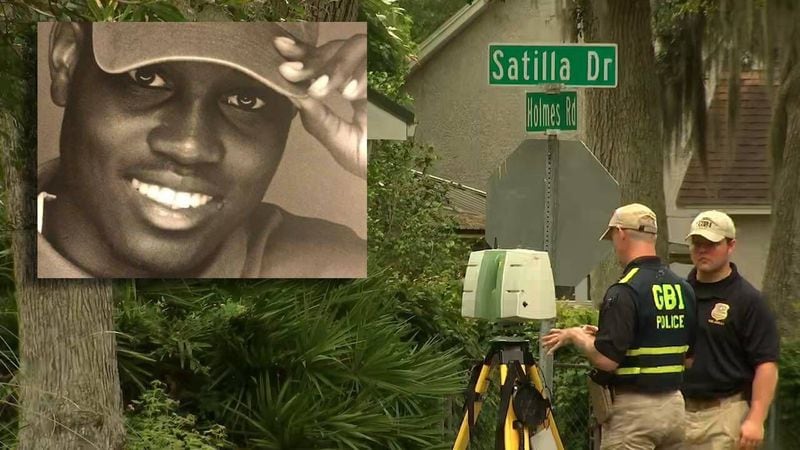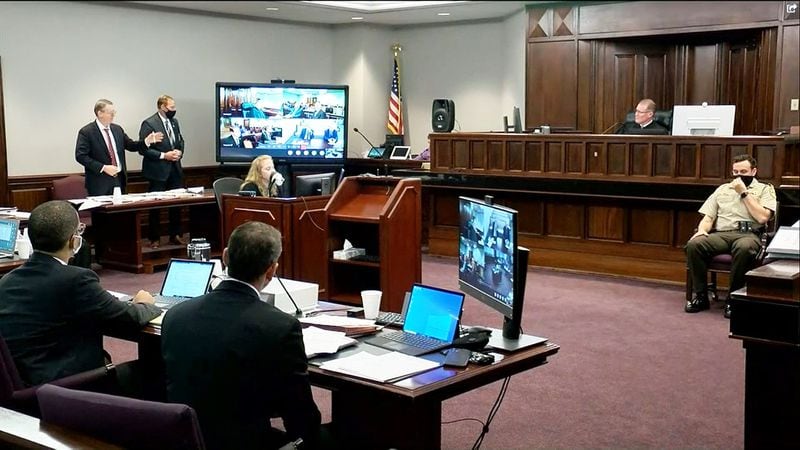Defense attorneys representing the three men charged with killing Ahmaud Arbery cannot present evidence at trial of Arbery’s past run-ins with the law, a judge has ruled.
Superior Court Judge Timothy Walmsley’s decision is a big victory for prosecutors, who had strongly opposed the defense attempts to get Arbery’s past “bad acts” before a jury. This essentially would have put the slain Arbery on trial.
“This is a good ruling for the prosecution,” said former Gwinnett County District Attorney Danny Porter, who is following the case. “If that evidence had come in, it would have been damaging but not fatal to the state’s case. But since it doesn’t come in, it means the prosecution won’t have to play defense.”
Travis McMichael, his father Greg McMichael and a neighbor, Roddie Bryan, are charged with murder in the fatal shooting of Arbery, who was unarmed. The three defendants, who are white, are scheduled to stand trial in Brunswick on Oct. 18.
The 25-year-old Arbery, who was Black, had a history of thefts, obstruction, illegal gun possession and entering into homes and businesses, said Jason Sheffield, one of Travis McMichael’s lawyers. “Why the judge would now decide that all of his prior motives, his intent, his plan to do these things is not relevant in this case is baffling.”
Sheffield added that the jury has to try and understand why Arbery was in the neighborhood that day, what he was doing there and why he ran from Travis and Greg McMichael when they tried to question him. “Now they will be denied the truth,” Sheffield said of the jurors.
Lawyers for the McMichaels contend their clients were justified in chasing down Arbery in the Satilla Shores neighborhood because they were making a citizen’s arrest. The chase began after Greg McMichael saw Arbery running on his street from a house a few doors down that was under construction.
Under then-Georgia law, private citizens could detain someone if they had “reasonable and probable grounds of suspicion” that the person had committed a felony and was fleeing the scene.
In court motions, the McMichaels’ lawyers cited 10 prior “bad acts” committed by Arbery from 2013 to the weeks leading up to his killing. These included Arbery pleading guilty to taking a handgun inside a school gym and, in another case, pleading guilty to shoplifting. They also sought to introduce evidence of occasions when Arbery turned hostile when confronted by police.
The defense contended this would help show that Arbery was committing a burglary at the home under construction, not out for a jog as prosecutors say. (Arbery had no stolen items in his possession when he was killed.)
In his ruling on Monday, Walmsley noted that the McMichaels knew nothing of Arbery’s past when they chased him down that day. “It is apparent that defendants’ intended use of the victim’s other acts is to engage in speculation as to why Arbery acted as he did,” the judge wrote.
Walmsley also said the defense was trying to get “clearly bad character and propensity evidence” before the jury that is unfairly prejudicial. “The character of the victim is neither relevant nor admissible in a murder trial,” the judge wrote.
Evidence about Arbery’s troubled past may also mislead the jury, Walmsley said. It could lead the jury to believe that although Arbery did not commit a crime on the day he was killed, jurors could think “he may pose a future dangerousness in that he would eventually commit more alleged crimes and, therefore, the defendants’ actions were somehow justified on that basis.”
Even though Walmsley disallowed the defense from introducing evidence about Arbery’s past, there is still a possibility it comes in. For example, if prosecutors introduce evidence of Arbery’s past good behavior, the defense could try to rebut that with evidence of Arbery’s imperfect past.
Porter, the former Gwinnett DA, said he does not think the Cobb County prosecutors assigned to try the case will make such a mistake. “They’ll have to be alert to such a possibility though,” he said.
In a separate ruling also issued Monday, Walmsley allowed prosecutors and defense attorneys to question Larry English, who owns the Satilla Shores home that was under construction and which Arbery entered the day he died.
In a court motion, defense attorneys, joined by the prosecution, told Walmsley that English’s poor health and compromised immune system may not allow him to take the stand at trial. Walmsley said he will preside over the questioning at a Sept. 15 hearing closed to the public that will be captured on video and played to the jury at trial.









